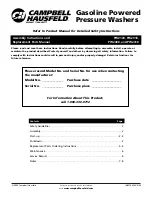
11
WASHER USE
Starting Your Washer
WARNING:
To reduce the risk of fire, electric shock, or injury to
persons, read the IMPORTANT SAFETY INSTRUCTIONS before
operating this appliance.
The following is a guide to using your washer. Please refer to
specific sections of this manual for more detailed information.
Do not store laundry products on the top surface of this washer.
Vibration is normal during operation.
Using the Proper Detergent
Use only High Efficiency detergents. The package for this type of
detergent will be marked “HE” or “High Efficiency.” This wash
system, along with less water, will create too much sudsing with a
regular non-HE detergent. Using regular detergent will likely result in
washer errors, longer cycle times, and reduced rinsing performance.
It may also result in component failures and noticeable mold or
mildew. HE detergents are made to produce the right amount of
suds for the best performance. Follow the manufacturer’s
instructions to determine the amount of detergent to use.
Use only HE High Efficiency detergent.
First Wash Cycle Without Laun
d
ry
Before washing clothes for the first time, if not completed during
the complete installation step, choose the Normal cycle and run it
without clothes. Use only HE High Efficiency detergent. Use 1/2
the manufacturer’s recommended amount for a medium-size
load. This initial cycle serves to ensure the interior is clean before
washing clothes.
For All Wash Cycles
1. To loa
d
washer
Open the washer door by pulling on the handle. Sort laundry
according to color and type of fabric. Place a load of sorted
clothes in the washer. Do not overload washer. Overloading
can cause poor cleaning.
■
Always empty pockets. Small items can be caught within
the washer resulting in noise or plugging the pump.
■
The washer can be fully loaded, but not tightly packed.
Washer door should close easily.
■
Mix large and small items. Avoid washing a single item.
Load evenly.
■
Wash small items such as infant socks in mesh garment
bags. It is recommended that more than one garment bag
be used and that each garment bag be filled with equal
amounts of material.
■
When unloading garments, occasionally check under the
rubber rim at the front of the tub for small items.
2.
Close the washer door by pushing it firmly until the lock clicks.
After a lock check at the beginning of the cycle, the washer
door will remain locked during the wash cycle.
NOTE:
After any wash cycle is completed, the door must be
opened and then closed before a new cycle can begin. The
door can be opened only if START/PAUSE is selected while
the Add Garment light is illuminated or if the cycle has been
canceled. See “To cancel a cycle” in the “Changing Cycles
and Options” section.
3.
Open the dispenser drawer and add laundry products to the
detergent, bleach, or fabric softener compartments. Close
drawer slowly to avoid spills. See “Using the Dispenser.”
4.
Turn on the washer by pressing POWER or Select Cycle
button. Select one of the cycles by pushing the cycle selector.
The indicator light for the selected cycle will illuminate. When
selecting a Wash Cycle, the TEMP indicator light for the preset
temperature will illuminate. This setting provide the
recommended fabric care for the selected cycle. See
“Cycles.”
5.
Select the desired Options. Not all Options are available with
all cycles. See “Options.”
6.
If desired, select the Cycle Signal. The signal is helpful when
you are washing items that should be removed from the
washer as soon as it stops. Press and hold CYCLE SIGNAL to
select signal on or signal off.












































